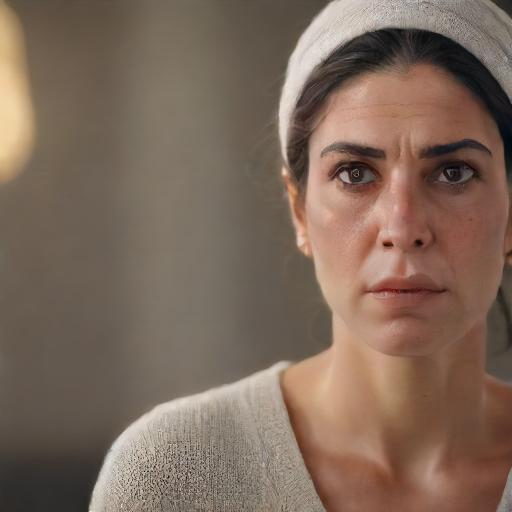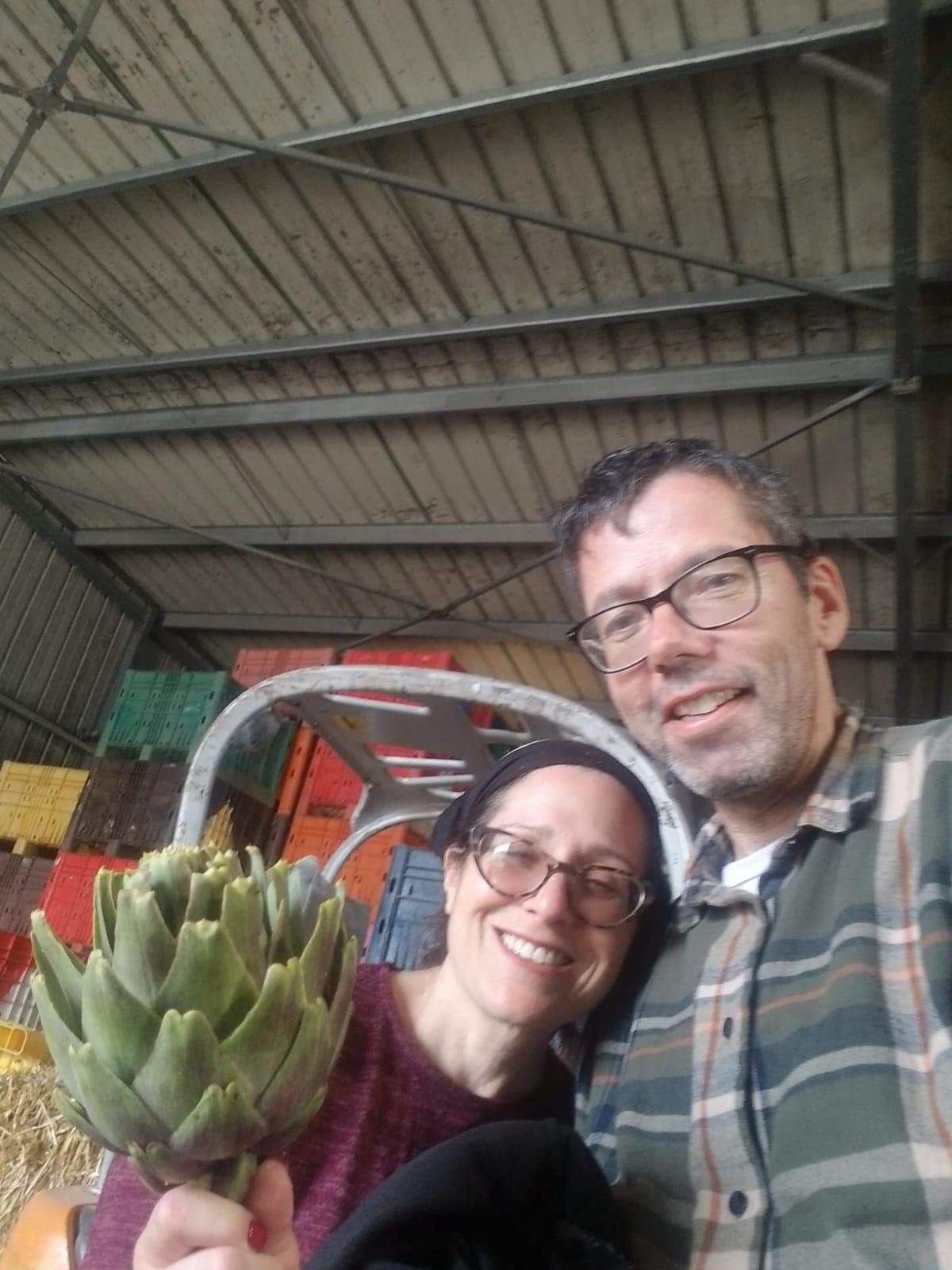Does Love Really Conquer All? Navigating the Challenges of a Partner on the Front Lines
Does Love Really Conquer All? Navigating the Challenges of a Partner on the Front Lines
Pop culture loves to romanticize the idea of heartfelt letters sent to partners at war and tokens of love carried in helmets and boots. But after eight months in this new reality, we know it’s far from glamorous.
Let’s be real – maintaining a normal routine can seem impossible when every alert on your phone or knock on the door sends your heart rate through the roof. While your partner is away and in danger, your days at home feel like a never-ending anxiety marathon. Sleep? What’s that? Eating? Only if stress counts as a food group.
You may feel like you’re living on a different planet from everyone else, pulling away from friends and family who just don’t get it. The guilt of enjoying anything while someone you care for is in harm’s way might make you ditch activities you once loved. And the relationship? It can feel like you’re stuck in a perpetual long-distance limbo, constantly hitting the reset button. Frustration is natural when your partner can’t be there for you, even though you understand why.
Supporting a partner in the military requires immense patience and compassion, which can be draining alongside maintaining a normal routine without their help. Here are some common obstacles to be aware of:
– Trauma: A soldier may overshare, leaving you overwhelmed, or undershare, leaving you both feeling disconnected.
– Compassion Burnout: The relationship can start to feel like a one sided game of emotional tug-of-war – one partner pulling all the emotional weight, while the other may barely have the strength to hold on to the rope. The imbalance long term will make the former feel exhausted and unsupported, no matter how much you may accept the crazy nature of the circumstances.
– Disjointed Communication: You may seek support elsewhere, in the efforts to not add anything more to the plate of your partner. Conversely, your soldier may do the same in efforts to avoid burdening you with even more emotional baggage. Both of you think you’re helping, but this can be misinterpreted as a lack of interest or reliability. In reality, it deprives you both of the opportunity to support each other during a difficult time, creating even more tension than what you were trying to avoid.
Throughout these serious challenges, you’ve made it this far together, and that’s no small feat. Here are some strategies to help strengthen that momentum:
– Let Your Soldier Be There For You: Keep the relationship warm by letting your partner support you in small ways. Resist the idea that now isn’t the time to express your needs or worries. Sure, now is the time to be be more understanding of your partner’s imperfections, but expressing your concerns about things your partner can reasonably do differently to better support you creates opportunities for reassurance and connection. This keeps the relationship warm and loving.
– Regaining Control: Any sense of control you can muster will make coping easier. Approach your days with the intention of accepting the limitations on communication and connection, rather than resigning to them. Make the decision to use time apart as productively and positively as you can manage. Assume your partner is safe unless you hear otherwise. Limit news consumption by setting specific times for updates. Engage in
calming activities when overwhelmed, like exercising or cooking, to regain a sense of control.
– Seek Support: It’s a mistake to think that matching your partner’s heroics means that you need to do this alone. Don’t wait until you’re breaking down to seek support from friends, family, and a therapist. This is a rational, mature decision that is done in the service of your ability to be healthy and functional.
– Practice Self Care: Eat well, exercise, and do things that bring you joy. Maintain your ability to be present and productive in your daily routines. It may feel uncomfortable to attempt and enjoy yourself while others who are dear to you cannot. But it is no service to anyone if you’re running on empty. Do what you need to maintain your ability to support yourself and others, see self-care as part of your service.
– Spiritual Connection: Knowing that Hashem is above you can give you a feeling of being held. Knowing that you aren’t in control can help you to let go and not feel the need to be in the driver’s seat.
Hollywood often paints war and trauma as experiences that strengthen relationships, but we understand that reality is more complex. It’s okay if this time doesn’t automatically deepen your bond. However, it can still be a period of growth for your relationship, albeit in unexpected ways. Redefining your limits, and embracing newfound flexibility and empathy are all extraordinarily difficult, but they are the things that will enable you to navigate this challenging time together. By supporting each other and nurturing yourselves both as individuals and as partners, you can emerge stronger and more connected than ever before.
Is your Relationship ready for Aliyah?
Is your Relationship ready for Aliyah?
So you’ve sold your toaster, enrolled the kids in school, donated a bunch of old books, arranged the lift and now all that’s left to do is jump on the plane to fly off into the land of milk of honey. Ahh the Romance of a new life in Eretz Yisrael. A lifelong dream come true…That is unless you don’t strangle each other first…
Making Aliya can be more stressful than planning a wedding and it can truly test your relationship. For starters, there is an often an imbalance of excitement, with one partner decidedly less thrilled about the prospects of starting life from scratch.
When this is the case, it can be the unraveling of an otherwise solid relationship- IF you don’t learn to shore it up well before disembarkment.
Seeing the support of a qualified marriage therapist prior to Aliyah is one of the most important steps you can take to ensure a successful transition.
For most, making Aliyah isn’t just a physical change but also an emotional adjustment. While anxiety about the kids and their transition is often center stage, we forget that our relationship’s well being will either nurture the family’s adjustment or hinder it.
Throwing yourselves in a situation where you are no longer confident in doing even the simplest tasks can be incredibly stressful. Your dream of a tuition free lifestyle can begin to shatter when the frustrations of opening up an Israeli bank account leads to an argument about finances. Leaving the dud on overnight can set off a heated discussion on responsibilities and 5 minute shower requirements . The strongest of marriages can be tested over a debate of Macabi vs Meuchedet health insurance policies.
Seeking out therapy to strengthen your marriage is not on everyone’s Aliyah To Do list but doing so can help transition towards a more successful Aliya – one of both practicalities and romance.
Here are some steps you can take well before departure so you can ensure a smooth landing ….
- Learn about the different school systems in the potential neighborhoods. Their strengths and their weaknesses. What are you ready to supplement for at home?
- Understand that there are varying hashkafic differences between where you come from and Israel. This can vastly impact where you choose to live. Speaking to people who live here can prepare you better for these differences and help you navigate where you live and school choices.
- Unlike Anglo countries, where people largely mind their own business, in Israel it is more common for people to give their two cents about everything…. From telling you off for not clothing your child warmly enough in winter to asking about your monthly wages. This will seem confrontational, and it is. Keeping to boundaries that you are used to is important. Just being aware that this quite likely will happen will prepare you for inevitable unpleasantries.
- Be sure to make time to check in with your spouse/partner regularly to share your daily challenges. Having a healthy sense of humor is essential at helping you make it through as you will no doubt encounter many bizarre situations that challenge your values and even your sense of self.
- Expect the unexpected: knowing that there is a vast difference between visiting Israel and living here is key. There are many things that you simply can’t know about or prepare for as things are constantly changing in Israel. Knowing that it takes time to adjust is crucial.
- Know that your children may have a hard time and will need more of a listening ear and compassion. They will probably miss their friends and creature comforts. While you can’t give them everything, you can provide them with a feeling of stability. You will be there to see them through this, and you’ll do it together.
- If you are having a hard time with the adjustment and providing the stable base your child needs, reach out for help. Reach out to one of our Loving Wisely therapists to receive the support you need.
Embarking on Aliyah is a significant step that brings both excitement and challenges. By preparing emotionally and seeking the right professional support, you can strengthen your relationship and ensure a smoother transition for your entire family. Don’t hesitate to reach out for help; doing so can make all the difference in turning your dream of life in Israel into a fulfilling reality.
Navigating Grief
Navigating Grief
The loss of a fiancé or partner in war is an unimaginable heartbreak that changes you forever. When lives are planned and dreams crafted together are crushed abruptly, the resulting grief is overwhelming.
Grief is an intensely personal journey that doesn’t follow a timetable or set pattern. It’s a rollercoaster, of a broad spectrum of emotions—from deep pain, sadness, and anger to confusion and perhaps even brief moments of peace. These feelings are all part of the natural grieving process, and embracing them can be crucial for your emotional healing.
The support of friends, family, or a community group of those who have experienced similar losses is vital. You are not alone, and while they may not fully understand your pain, their support during this terrible time is so important.
The grieving process is also physically demanding. It can wreak havoc on your body. Maintaining regular sleep and exercise can support both physical and emotional resilience. Remembering to eat is also important. Your body needs fuel to function.
Emotional triggers, like a specific food they loved, their favorite flower, anniversaries, or holidays, can be excruciatingly painful. Having a plan to manage these triggers can make a huge difference. Whether you choose solitude or the company of others, prioritize what brings you solace and healing. And it is OK to cry.
And if, despite doing everything you can to heal, the weight of grief feels too heavy to manage, consider getting professional help. A therapist specializing in grief will offer experienced support and guidance, helping you navigate your emotions and facilitate healing.
There is no “right” way to grieve. Healing from such a deep, painful, and life-altering loss is a gradual process. Allow yourself the time and space to mourn in a way that feels right for you. Moving forward does not mean forgetting your loved one. It means integrating this profound experience into your life in a respectful and meaningful way.
Try to remember that each step forward is part of a larger process toward healing. This path is uniquely yours, and it’s perfectly okay to move at a pace that feels right for you as you find your way back to hope and inner strength.
Pride, Privileged and Petrified
Proud, Privileged and Petrified
In just two short weeks, my son begins his service with the Tzanchanim, and I’m caught in a whirlwind of emotions. Pride surges through me, knowing he’s taking a stand for our homeland and our people. Yet, a deep-seated fear about the dangers he’ll face lingers in the pit of my stomach.
When the war erupted on October 7th, I was initially washed over with selfish relief that my son was safe in Yeshiva. It was a difficult realization, understanding I had wished for another’s child to shoulder the weight of our safety. This jarring insight propelled me to consider, “What can I do to contribute?”
Mid-October turned into a frenzy of action as we rallied to support our chayalim—collecting essentials, aiding army families, and providing therapy for those impacted by the Nova festival. The thought of being a soldier’s parent haunted me. How does it feel to know your child is courageously facing such formidable challenges? Despite my fears, I was compelled to navigate these emotions by facilitating support groups for parents of frontline soldiers.
In quieter moments, my thoughts drift to my son’s childhood—the terror he felt at a small merry-go-round, the tantrum over not getting every toy animal, and strangers attempting to soothe him with candy. It’s astonishing to reflect on how that fearful boy has grown into a selfless young man, determined to confront evil and protect us all.
Our recent discussions have ventured into difficult territories, contemplating worst-case scenarios. He’s shared with me his willingness to sacrifice for Am Yisrael, even if it means facing the gravest outcomes. His faith in the future of Israeli technology, to overcome potential injuries, is unwavering. These were conversations I never anticipated having.
Leading these support groups has been an immensely rewarding experience. Initially reticent, we’ve gradually opened up, sharing our deepest fears and finding comfort in our collective resilience. It’s been a profound honor to share in this journey.
Through these groups, I’ve gained invaluable insights into the lives of soldiers and their parents, preparing me for the realities of wartime. The sense of community and the tools to manage our emotions have been a tremendous support.
As we continue to navigate these challenging times together, I’m heartened by the strength and solidarity of parents like me. I am deeply thankful to Kav L’Noar for their instrumental role in establishing these support groups nationwide.
For those interested in joining a support group, please contact [email protected].
The Artichoke
The other week, while sorting through the artichokes at Mishmor Ayalon farm, I started thinking about how peeling an artichoke is a bit therapeutic.
You start with the outer leaves, which are pretty hard and not really edible. With each leaf, you get a little closer to the heart, and the leaves get softer, more tender.
It is kind of how, with people, getting past the surface level stuff takes time and effort. You go through the motions, the small talk, until you start hitting the good stuff—those soft, inner leaves where things get more interesting.
Getting to the heart, though, that’s where the real challenge is. You have to carefully remove the choke, this fuzzy part that’s not pleasant to eat. It’s a delicate operation, almost like navigating through someone’s fears or insecurities. And then, there it is—the heart. It’s tender, delicious, and worth all the effort, a moment that softly declares, “This is what it’s all been for.”
All the peeling, the effort to get to the core of something, it’s a lot like building connections with people. It’s messy, it takes work, but the heart of it all? Totally worth it. Never thought I’d learn so much from an artichoke, but there you go.
Reuniting with your children – A War Story
Picture this – A father, who’s been away at war, finally walks through the door, expecting open arms and laughter. Instead, he’s met with shy glances or, even tougher, outright resistance from his own kids.
The journey back home from deployment is an emotional rollercoaster for any family. This “rejection” isn’t about love lost but rather about the shifts and insecurities that have crept in during his absence.
Children get used to routines, and when one parent has been the anchor for months or years, the return of the other can feel like a shake-up nobody asked for. It’s not that they don’t want their dad around; it’s that they’ve adapted to a life where mom does it all. And lurking beneath their hesitation is a worry that might weigh heavy on their little hearts: what if dad leaves again?
Addressing these challenges requires patience, understanding, and open communication from all family members. Fathers can take proactive steps such as:
- Engaging in Daily Routines: Participate in regular family activities and routines to re-establish your presence and role within the family.
- Quality Time: Spend one-on-one time with each child, engaging in activities they enjoy. This can help rebuild trust and strengthen individual relationships.
- Open Communication: Encourage open discussions about feelings and fears. Acknowledge the changes and challenges, and reassure your children of your love and commitment to them.
- Seeking Support: Professional guidance from a relationship and trauma therapist can provide invaluable support to families navigating the reconnection process. Therapy can offer strategies tailored to your family’s unique needs and facilitate a smoother transition.
The journey of reintegration into family life post-deployment is a path filled with learning and growth for both the returning parent and their children. While the initial phase may be marked by feelings of rejection, with patience, love, and the right support, families can rebuild stronger and more resilient bonds than ever before.
Remember, it’s not about replacing the time lost but about cherishing and making the most of the time we have now.
Together, with understanding and support, families can navigate the complexities of reconnection and family life.
Seeing beyond the scars
I’ve had the profound honor of working with soldiers returning from combat. These brave individuals carry with them stories of incredible courage and resilience, along with both visible and invisible scars. These scars are not mere marks; they are profound alterations to their identity and reminders of the sacrifices they’ve made. Many of these young men and women had once envisioned a life of normalcy, which now seems a distant reality as they navigate their way through a new world with their injuries.
In today’s society, where physical appearance often dictates first impressions, the prospect of entering the dating scene can feel like an insurmountable challenge for these warriors. The question arises: Can love transcend the physical alterations and recognize the individual beneath?
Through my experience, I’ve learned that while physical attraction may initially draw people together, it’s the depth of connection and mutual respect that sustains a relationship. It’s about discovering someone who can look beyond the scars to see the strength and resilience that comes from overcoming adversity. Yes, there are individuals swayed by societal pressures who prioritize physical appearance, but there are also many who understand that true beauty is found in the essence of our experiences, the battles we’ve fought, and the inner strength we’ve cultivated. These are the people who view a missing limb not as a deficiency but as a symbol of survival and bravery.
For soldiers re-entering civilian life, the search for love is often intertwined with fears of rejection and misunderstanding. They worry that their physical wounds might define them in the eyes of potential partners, overshadowing their personalities, values, and the incredible resilience they possess. The fear of rejection extends beyond the visible injuries to the internal struggles that remain hidden from view. It’s crucial for them to find partners who not only understand their journey but also honor their sacrifices and see the courage it took to survive.
The quest for a life partner transcends the mere act of finding love; it’s about seeking acceptance and deep understanding. It involves connecting with someone who recognizes the profound impact of their experiences and appreciates the person they’ve become because of them. This journey of love is not just about seeing with the eyes but feeling with the heart, recognizing the beauty in resilience, the dignity in sacrifice, and the depth of character forged through adversity.
I encourage everyone to approach relationships with an open heart and mind, to look beyond the surface and to value the stories, strengths, and vulnerabilities each person brings. True connection is about embracing each other’s entire being, scars and all, and building a bond based on mutual respect, understanding, and unconditional acceptance.
Anger and Resentment
In the heart of Israel, amidst the ever-present echoes of conflict, there exists a world that often remains hidden from the global narrative.
It’s a world that I, as a trauma therapist living in Israel, navigate daily.
I have the privilege of being part of these families’ journeys, facilitating support groups that have become essential in navigating the complexities of war.
These groups are more than just therapeutic sessions. They are a place where parents and loved ones of soldiers find solace in shared experiences, creating a support network that becomes their lifeline. In these gatherings, the silent struggles and unvoiced fears find expression, and the unyielding strength of these families is palpable. Laughter and tears are shared freely, and stories of daily struggles and triumphs intertwine, forming a tapestry of the complicated life we are currently living.
One of the most striking stories I’ve encountered is that of Miriam, a mother whose son serves on the front lines. Her narrative resonates with a profound sense of isolation—a feeling echoed by many in the group. She speaks of her relatives abroad who, despite their best intentions, can’t fully grasp the constant tension that is an intrinsic part of her life. “They live in a different world,” she says, her voice laced with a mixture of anger and frustration, “They have zero understanding of our reality.”
In our sessions, we also focus on practical coping strategies,and somatic exercises. These are crucial in managing the stress and anxiety that come with living in a conflict zone. They offer a way to address the physical manifestations of emotional turmoil, providing a much-needed outlet for release and relief.
The personal journeys of these families remind us that the impact of war extends far beyond the battlefield. It seeps into homes and hearts, leaving a lasting imprint. Yet, amidst this landscape of uncertainty and fear, there emerges stories of incredible strength and unity.
In the midst of this unrelenting conflict, it’s the personal narratives of courage and connection, intertwined with the critical journey of confronting and navigating the trauma, anger, anxiety and overall emotional turmoil, that truly highlight the enduring spirit and resilience of the families on Israel’s homefront.
When Survival Overrides Passion – The Complex Impact of War on Sex Drive
When Survival Overrides Passion
War’s effects on a person’s sexual desire can be complex and unique to each individual, shaped by various physical, psychological, and social elements. The impact of war is not just a series of statistics or clinical observations; it’s a deeply personal, often heart-wrenching experience for those involved.
“Michael’s return from Tzuk Eitan marked a profound change in his and Sarah’s life. The loss of his leg was more than a physical challenge; it created an emotional distance between them. Sarah deeply missed their spontaneous intimacy, but now there was a hesitation, a barrier that wasn’t there before. Michael grappled with his new reality, struggling not just with adapting to a prosthetic but with relearning how to be with Sarah. Their way of expressing love and desire faced new challenges, as the physical loss evolved into an emotional chasm.”
In therapy, they found a safe space to voice their fears and longings. Sarah spoke of missing their effortless connection, while Michael shared his feelings of inadequacy. Through open communication and guided support, they began to bridge the gap that had formed between them. They learned to navigate these uncharted waters of change and intimacy, slowly finding new ways to connect and rekindle the flame that had dimmed as a result of the war. This new chapter of their lives became a journey of healing, understanding, and rediscovering each other in the midst of altered circumstances.
Here’s a simpler breakdown of how war might change someone’s sex drive:
- Stress and Trauma: War can cause extreme stress and trauma, impacting mental and emotional health. This stress can lead to a lower libido in some.
- Mental Health: Conditions like PTSD, depression, and anxiety from war can harm mental health. These issues can decrease sexual desire and function.
- Physical Health: Injuries, disabilities, or chronic conditions from war can impact sexual ability and desire.
- Displacement and Life Changes: Being forced to leave home due to war disrupts life and relationships, impacting intimac
- Cultural and Social Shifts: War can change social norms and expectations, influencing relationships and sexual behavior.
- Relationship Strain: War brings challenges like separation and loss, which can strain relationships and reduce intimacy.
- Survival Focus: During war, basic needs like safety and food take priority, often shifting focus away from sex.
- Gender Dynamics: War can alter traditional gender roles, impacting sexuality and relationships.
Everyone reacts differently to war, and while some find comfort in relationships, others face difficulties. The impact of war on sex drive is also shaped by cultural background, personal resilience, and available support. Michael and Sarah’s story is just one example of the many complex ways in which war can reshape the most intimate aspects of our lives.
The impact of this war upon relationships
The impact of this war upon relationships
As we surpass the three-month mark of the ongoing conflict, the profound impact on personal relationships has become increasingly clear. This challenging period has tested the resilience of bonds between partners and families, leading to both strengthening and straining of connections.
Remarkably, adversity has brought many closer together. Individuals are cherishing their loved ones more, recognizing the fragility of life. There’s a renewed commitment to spend quality time with partners and children. A shift in perspective is also noticeable, with a focus on gratitude over criticism in relationships, fostering a more nurturing environment. Discussing daily war events has become a moment of connection for many couples. Families are seeking solace in their relative safety and finding comfort in volunteering and community contribution, which strengthens their bond.
Conversely, the stress of the situation has highlighted differences, leading to challenges. Varied approaches to the conflict and political ideologies are more pronounced, from ceasefire advocacy to differing views on military strategies. The intense situation is affecting people differently, stirring a range of emotions and impacting aspects like intimacy.
Effective communication and emotional support are essential in these times. It’s vital for partners to recognize and respect these differences rather than attempting to ‘fix’ the feelings of the other. The crux lies not in agreeing on every aspect but in understanding and empathetically responding to each other’s triggers. It’s about providing a supportive presence, not solutions. In times of crisis, the ability to navigate emotional landscapes together can turn challenges into opportunities for deepening relationships.









